There are More Bikes Than Ever in Afghanistan—But No Women Riding Them

Last month, NPR reported something interesting, though not at all surprising: There was a cycling resurgence happening in Kabul in Afghanistan, but noticeably absent were women riders. That’s because—more than a year after the Taliban took control of the country—women are still unable to do simple things like going outside unaccompanied, or riding a bike. And with the country’s rapidly failing economy, access to cars, taxis or even public transit has become prohibitively expensive, leaving cycling as the best option for commuting.
The only place where the economy is thriving? Bike shops and bike repair stands, NPR claims. But not in new bike sales. “I used to sell bikes for kids and for teenagers,” Tawfik Shirzad told NPR. “It’s so busy. But it makes me sad. When people buy a bike from me right now, it means their livelihood is in trouble. I can’t be happy.” He notes that despite his current stock of new bikes, the ones he’s selling are the secondhand bikes that are on their last legs (wheels?).
And the inability to leave home or work means that women are excluded from the cycling narrative in Afghanistan once again. Before the Taliban seized control, women were beginning to find their way into cycling, from road to MTB, forming teams and clubs. (We’ve written extensively about their efforts in the past.)
But now? Women don’t feel safe riding, considering they’re not allowed outside at all. As NPR’s Diaa Hadid so succinctly put it, “The Taliban haven’t forbidden women from riding bikes—they don’t have to. They’ve told women to cover up and stay home. They’ve ordered them to have a male guardian when they leave the house. And that old conservative culture that sees a woman biking as shameful is back.”
There is some small amount of hope for women riders from Afghanistan, though. Many were able to flee from the Taliban’s oppressive regime in the past year, and have been relocated around the world. And in just under three weeks, the UCI will be hosting road nationals for Afghani women in Aigle, Switzerland, at UCI headquarters.
The Afghan women cyclists in the Women Elite and Women Under 23 categories will compete on a course comprising two laps of a 28.5 km circuit, starting and finishing at the UCI World Cycling Centre.
“It is very important for the UCI to commit to helping members of the world cycling family who are deprived of the freedom to live their passion and pursue their dreams,” UCI President David Lappartient said in the press release. “In this perspective, after its initiative to help the Afghan cycling community by participating in the evacuation of its members whose physical integrity was threatened, the UCI has decided, exceptionally, to ensure, in collaboration with its partners, the continuity of the sporting activities of the Cycling Federation of Afghanistan by organising its Women’s National Road Cycling Championships this year.”
Riders on the start line will include 26-year-old Masomah Ali Zada, the first female Afghan cyclist to take part in the Olympic Games as part of the refugee team created by the International Olympic Committee at Tokyo 2020. No other riders have been disclosed, though several women riders were brought to Switzerland when they fled Afghanistan last year and will hopefully be on the start line. That said, it’s unlikely to be a well-attended event, since the cyclists who fled Afghanistan are spread around the world, with many still awaiting proper paperwork and visas that would allow them to travel to compete. There is still much work to be done to protect these women, and help the others who remain in Afghanistan—but hopefully, having their own National Championships will serve as a reminder that there are determined women of Afghanistan who will continue to ride.
You Might Also Like

